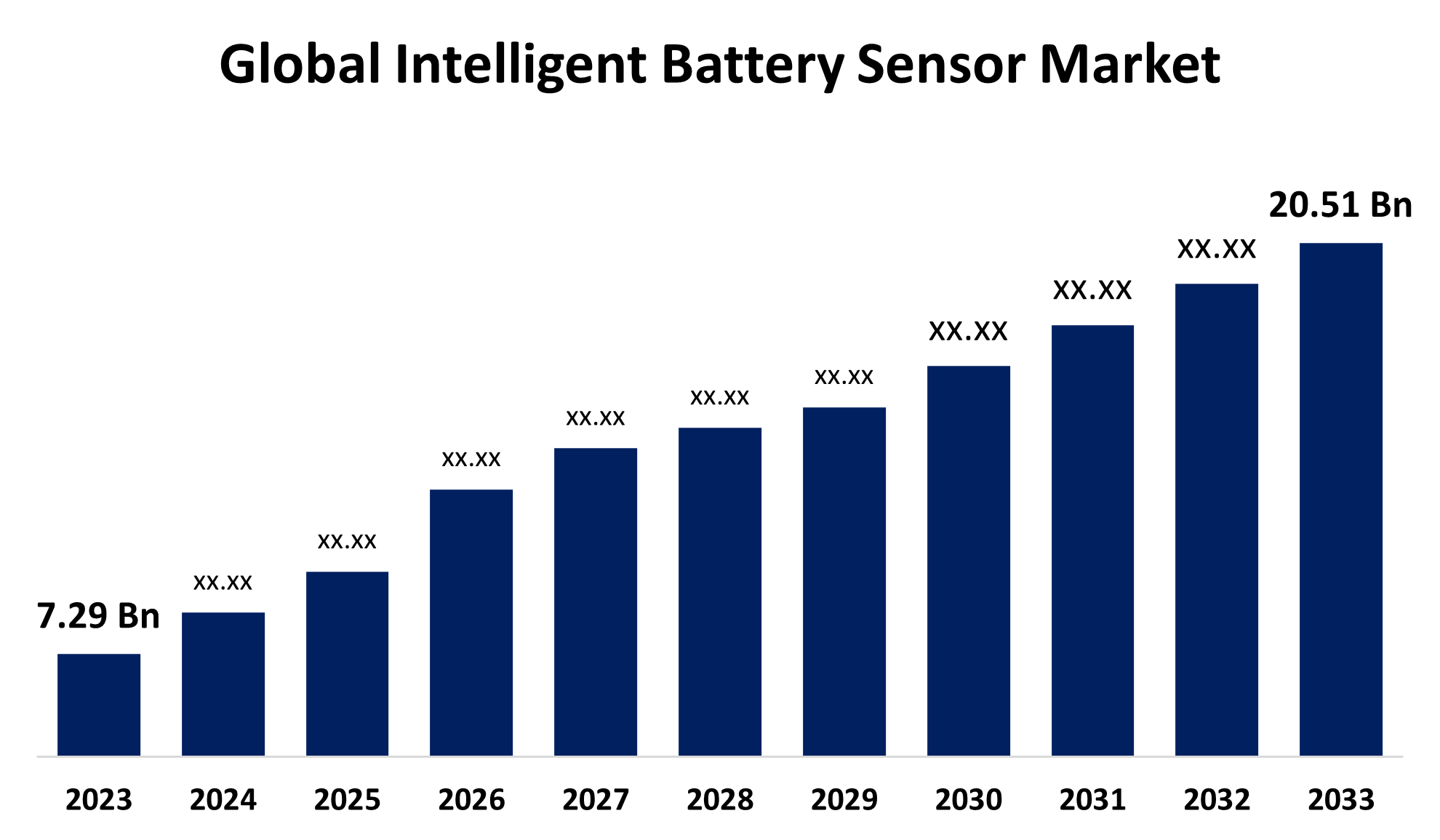Global Intelligent Battery Sensor Market Size, Share, and COVID-19 Impact Analysis, By Type of Sensor (Voltage Sensors, Current Sensors, Temperature Sensors, and Integrated Sensors), By Vehicle Type (Passenger Vehicle, Commercial Vehicle, and Electric Vehicles), By Sales Channel (OEM and Aftermarket), and By Region (North America, Europe, Asia-Pacific, Latin America, Middle East, and Africa), Analysis and Forecast 2023 - 2033.
Industry: Semiconductors & ElectronicsGlobal Intelligent Battery Sensor Market Insights Forecasts to 2033
- The Global Intelligent Battery Sensor Market Size was estimated at USD 7.29 Billion in 2023
- The Market Size is Expected to Grow at a CAGR of around 10.9% from 2023 to 2033
- The Worldwide Intelligent Battery Sensor Market Size is Expected to Reach USD 20.51 Billion by 2033
- North America is expected to grow the fastest during the forecast period.

Get more details on this report -
The Global Intelligent Battery Sensor Market size was worth around USD 7.29 billion in 2023 and is predicted to grow to around USD 20.51 billion by 2033 with a compound annual growth rate (CAGR) of approximately 10.9% between 2023 and 2033. The global trend towards electric cars (EVs), driven by government policies that reduce carbon emissions as well as customer demand, is a major growth driver.
Market Overview
The global intelligent battery sensor (IBS) market refers to the market for electronic devices used to monitor and manage the health and performance of batteries. These sensors measure parameters such as voltage, current, temperature, and state of charge to ensure optimal battery performance. The automotive industry's shift to electric vehicles (EVs) demands sophisticated battery management systems, and smart battery sensors are essential to ensuring the longevity, safety, and efficiency of batteries. The need for intelligent battery sensors is increased by the development of solid-state and high-capacity lithium-ion batteries, which require careful monitoring to maximize performance. Furthermore, the significance of these sensors in reducing energy waste and prolonging battery life is highlighted by the growing emphasis on energy efficiency across several industries, including the automotive and industrial sectors. Additionally, new opportunities for predictive maintenance and sophisticated battery management are made possible by the integration of intelligent battery sensors with cutting-edge technologies like artificial intelligence (AI), machine learning (ML), and big data analytics. Improved battery performance, lower operating costs, and higher customer happiness are all possible outcomes of this technological synergy.
Report Coverage
This research report categorizes the global intelligent battery sensor market based on various segments and regions forecasts revenue growth and analyzes trends in each submarket. The report analyses the key growth drivers, opportunities, and challenges influencing the global intelligent battery sensor market. Recent market developments and competitive strategies such as expansion, type launch, development, partnership, merger, and acquisition have been included to draw the competitive landscape in the market. The report strategically identifies and profiles the key market players and analyses their core competencies in each sub-segment of the global intelligent battery sensor market.
Global Intelligent Battery Sensor Market Report Coverage
| Report Coverage | Details |
|---|---|
| Base Year: | 2023 |
| Market Size in 2023: | USD 7.29 Billion |
| Forecast Period: | 2023-2033 |
| Forecast Period CAGR 2023-2033 : | 10.9% |
| 2033 Value Projection: | USD 20.51 Billion |
| Historical Data for: | 2019-2022 |
| No. of Pages: | 207 |
| Tables, Charts & Figures: | 111 |
| Segments covered: | By Type of Sensor, By Vehicle Type, By Sales Channel, By Region |
| Companies covered:: | Robert Bosch GmbH, HELLA GmbH & Co. KGaA, Continental AG, Valence Technology, Inc., NXP Semiconductors N.V., Midtronics, Inc., Texas Instruments Inc., Analog Devices, Inc., DENSO Corporation, Infineon Technologies AG, TE Connectivity Ltd., Eberspaecher Vecture Inc., and other key players |
| Pitfalls & Challenges: | COVID-19 Empact,Challenges, Future, Growth, & Analysis |
Get more details on this report -
Driving Factors
The global trend towards electric cars (EVs), driven by government policies that reduce carbon emissions as well as customer demand, is a major growth driver. The market for intelligent battery sensors is also expanding as a result of increased technological integration. Additionally, there are numerous prospects in the intelligent battery sensor market, especially in emerging countries like Asia-Pacific, Latin America, and Africa. These areas provide substantial growth potential for market participants due to the increasing use of renewable energy systems and electric vehicles.
Restraining Factors
The expensive cost of the sophisticated technology and integration needed for intelligent battery sensors is one of the main obstacles, which can put off potential customers. There are also technological difficulties in ensuring compatibility with different battery types and vehicle systems.
Market Segmentation
The global intelligent battery sensor market share is classified into type of sensor, vehicle type, and sales channel.
- The integrated sensors segment accounted for the largest share in 2023 and is projected to grow at a substantial CAGR during the forecast period.
In the terms of type of sensor, the global intelligent battery sensor market is divided into voltage sensors, current sensors, temperature sensors, and integrated sensors. Among these, the integrated sensors segment accounted for the largest share in 2023 and is projected to grow at a substantial CAGR during the forecast period. The growth in the segment is fueled by their capacity to integrate several monitoring functions, such as voltage, current, and temperature measurements, into one device. This consolidation makes battery management systems easier and offers end-to-end insights into battery health and performance.
- The passenger vehicle segment accounted for the highest revenue share in 2023 and is anticipated to grow at a significant CAGR during the forecast period.
In the terms of vehicle type, the global intelligent battery sensor market is divided into passenger vehicle, commercial vehicle, and electric vehicles. Among these, the passenger vehicle segment accounted for the highest revenue share in 2023 and is anticipated to grow at a significant CAGR during the forecast period. The increase in segment is attributed to the large number of passenger vehicles manufactured and sold worldwide. With automakers increasingly using advanced battery management systems to improve vehicle performance, safety, and fuel efficiency, the need for intelligent battery sensors in this segment keeps growing.
- The OEM segment accounted for the largest share in 2023 and is projected to grow at a remarkable CAGR during the forecast period.
In the terms of sales channel, the global intelligent battery sensor market is divided into OEM and aftermarket. Among these, the OEM segment accounted for the largest share in 2023 and is projected to grow at a remarkable CAGR during the forecast period. The growth in the segment is largely attributed to the direct incorporation of these sensors into new vehicles at the point of manufacturing. OEMs are responsible for ensuring that vehicles comply with strict safety and performance standards, thus creating demand for high-quality battery management solutions.
Regional Segment Analysis of the Global Intelligent Battery Sensor Market
- North America (U.S., Canada, Mexico)
- Europe (Germany, France, U.K., Italy, Spain, Rest of Europe)
- Asia-Pacific (China, Japan, India, Rest of APAC)
- South America (Brazil and the Rest of South America)
- The Middle East and Africa (UAE, South Africa, Rest of MEA)
Asia Pacific is anticipated to hold the largest share of the global intelligent battery sensor market over the predicted timeframe.

Get more details on this report -
Asia Pacific is anticipated to hold the largest share of the global intelligent battery sensor market over the predicted timeframe. The Asia Pacific market for intelligent battery sensors is growing extremely fast, propelled by the region's booming automobile sector, major technological developments in batteries, and rising adoption of electric vehicles (EVs). China, Japan, and South Korea are at the forefront of EV manufacturing and sales, primarily because of favorable government initiatives, massive investments in EV infrastructure, and growing demand by consumers for eco-friendly vehicles.
North America is expected to grow at the fastest CAGR in the global intelligent battery sensor market during the forecast period. The regional market is fueled by the region's robust automobile sector and the fast takeup of electric vehicles (EVs). Key automobile players and tech firms in the region are significantly investing in high-level battery management systems, hence driving the demand for intelligent battery sensors. Increasing focus on sustainability and energy efficiency, along with favorable government policies and EV incentives, also drives the market.
Competitive Analysis:
The report offers the appropriate analysis of the key organizations/companies involved within the global intelligent battery sensor market along with a comparative evaluation primarily based on their type of offering, business overviews, geographic presence, enterprise strategies, segment market share, and SWOT analysis. The report also provides an elaborative analysis focusing on the current news and developments of the companies, which includes type development, innovations, joint ventures, partnerships, mergers & acquisitions, strategic alliances, and others. This allows for the evaluation of the overall competition within the market.
List of Key Companies
- Robert Bosch GmbH
- HELLA GmbH & Co. KGaA
- Continental AG
- Valence Technology, Inc.
- NXP Semiconductors N.V.
- Midtronics, Inc.
- Texas Instruments Inc.
- Analog Devices, Inc.
- DENSO Corporation
- Infineon Technologies AG
- TE Connectivity Ltd.
- Eberspaecher Vecture Inc.
- Others
Key Target Audience
- Market Players
- Investors
- End-users
- Government Authorities
- Consulting And Research Firm
- Venture capitalists
- Value-Added Resellers (VARs)
Recent Development
- In November 2023, NXP introduced a new Battery Cell Controller IC designed to enhance the performance and safety of battery management systems (BMS) in electric vehicles (EVs) and energy storage systems. The new IC, known as the MC33774, offers high accuracy in cell measurement, down to ±0.8 mV, and robust lifetime design. This controller is engineered to optimize the usable capacity of lithium-ion batteries and ensure their safety over a wide temperature range, from -40°C to +125°C.
Market Segment
This study forecasts revenue at global, regional, and country levels from 2023 to 2033. Spherical Insights has segmented the global intelligent battery sensor market based on the below-mentioned segments:
Global Intelligent Battery Sensor Market, By Type of Sensor
- Voltage Sensors
- Current Sensors
- Temperature Sensors
- Integrated Sensors
Global Intelligent Battery Sensor Market, By Vehicle Type
- Passenger Vehicle
- Commercial Vehicle
- Electric Vehicles
Global Intelligent Battery Sensor Market, By Sales Channel
- OEM
- Aftermarket
Global Intelligent Battery Sensor Market, By Regional Analysis
- North America
- US
- Canada
- Mexico
- Europe
- Germany
- UK
- France
- Italy
- Spain
- Russia
- Rest of Europe
- Asia Pacific
- China
- Japan
- India
- South Korea
- Australia
- Rest of Asia Pacific
- South America
- Brazil
- Argentina
- Rest of South America
- Middle East & Africa
- UAE
- Saudi Arabia
- Qatar
- South Africa
- Rest of the Middle East & Africa
Frequently Asked Questions (FAQ)
-
What is the intelligent battery sensor market growth?The global battery sensor market is expected to grow at a compound annual growth rate of 10.9% from 2023 to 2033 to reach USD 20.51 billion by 2033.
-
Who are the key players in the intelligent battery sensor market?Key players are Robert Bosch GmbH, HELLA GmbH & Co. KGaA, Continental AG, Valence Technology, Inc., NXP Semiconductors N.V., Midtronics, Inc., Texas Instruments Inc., Analog Devices, Inc., DENSO Corporation, Infineon Technologies AG, TE Connectivity Ltd., Eberspaecher Vecture Inc., and Others.
-
What are the factors driving the intelligent battery sensor market?The global shift towards electric vehicles (EVs), propelled by both consumer demand and government initiatives aimed at reducing carbon emissions is a significant growth driver.
Need help to buy this report?